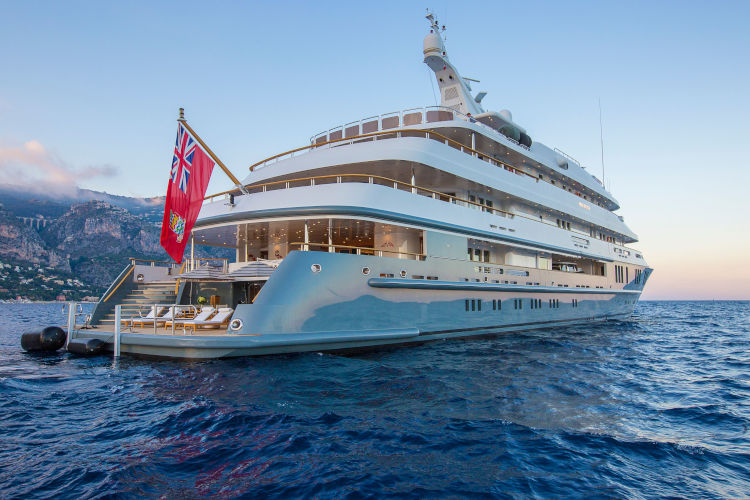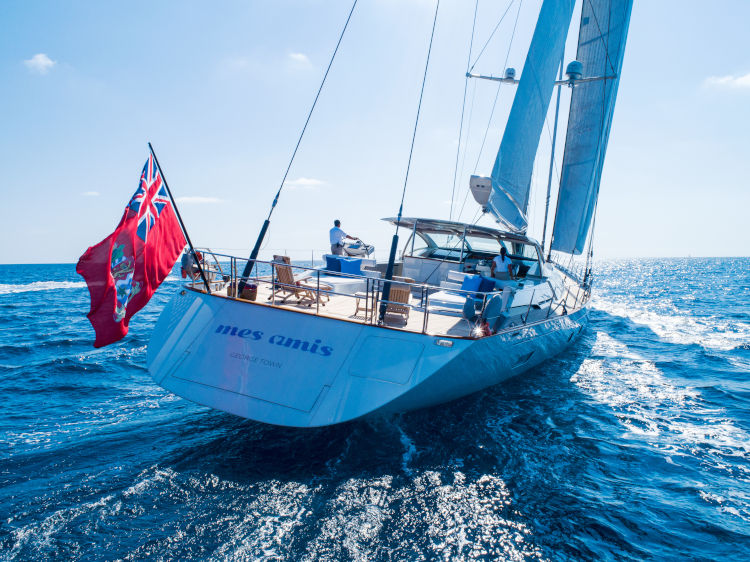Chris Cecil-Wright founded the Yacht brokerage, Cecil Wright & Partners, and has been in the field of helping people charter, build, and sell superyachts for the past 25 years. His focus is on super yachts over 40 meters (131 feet) and Northern European yacht builders, who he thinks are the best of the best.
His company is small and based in Monaco and London. There are 12 associates, which means, in his words, “we cannot be all things to all people.” Because his company is small, he has been able to unleash his passion for detail, as he is known in the field for knowing almost everything there is to know about the building of these yachts, the materials used in the building, who owned the yacht before, and all else.
We were pleased to be able to talk with him a few days ago.

SherpaReport: In a recent interview, you said something that I found very meaningful — that you considered yourself a specialist, not a generalist, in the yacht industry. Can you explain explain the process of being a specialist and why that is important to the Yacht brokerage and sales industry?
Chris Cecil-Wright: Being a specialist is an important, substantial value-add that I can provide. This means that I have developed and continue to develop a deep knowledge of the industry. We have to know what we are talking about, and have stories to back up what we tell the clients about the products they are interested in. We also have to define what we know about quality. Quality to many is expensive bling, but it is far more than that.
An example, the teak on the deck of a yacht - the point is that to the casual observer all teak on the deck of a yacht looks and feels the same but at Feadship so much more effort and attention to detail is employed.
The caveat to what I’m about to say is that teak is becoming much scarcer and more difficult to source so Feadship’s traditional approach is somewhat hampered.
Nonetheless the process is as follows, the teak buyer goes to Burma 10 years before the teak is required: trees are chosen whilst they’re still growing and those felled are taken to Holland as trunks. Once there, they are cut into even planks and stored in a light and humidity-controlled environment so that they dry and color in a consistent way.
The planks are then quarter sawn to leave only the part of the trunk that has the tightest grain and then they are laid at 25 mm thick. This is in contrast other shipyards that order the teak already cut into planks and lay it at 15 mm thick.
This whole process defines quality and worth – worth is the work that is unseen, but the result is intuitively felt and ultimately, known.

SherpaReport: We believe that the process or trajectory of owning a yacht company must have been a complex, though looking back, an inevitable path. Can you talk a little about how you went from A to B to where you are now?
Chris Cecil-Wright: Regarding my trajectory. I’m from the Midlands, which is as far away from the sea as you can get in England, but I grew up by the sea as my family built a house in Hampshire in the 1920’s which we still have. All my childhood holidays were spent there. Sailing was what we did. It never left me and it’s now a huge part of my life.
I’m also an ex British Army officer. I left in 1993 after a paragliding accident in which I broke my back. After convalescence I joined Camper & Nicholson’s where I was a trainee broker for two years before joining Nicholas Edmiston to found EDMISTON and Company as a Partner for 20 years.
We grew the business so much I found myself becoming a generalist and preferred to be a specialist - so I started my own business to become just that.
SherpaReport: In your yacht experience, how do you see the journey of the yacht buyer in contrast to the yacht charterer. Does the buyer take longer, is the path more complicated than the person who charters for a short time? Does the charterer often end up buying a yacht? Curious about the diverse or similar paths they take.
Chris Cecil-Wright: Here is the process in both cases:
Buying: find a broker you like and trust. Understand market fundamentals. Understand the difference in build quality among the various builders. Understand the myriad of options available in terms of size, style, capacity. Understand the costs associated with ownership. Narrow the market. View a selection of yachts. Identify a suitable candidate. Negotiate purchase terms. Sign an 8-page agreement. Employ a surveyor to carry out a thorough pre-purchase inspection. Digest the likely 100-page report. Renegotiate price or terms if necessary. Move to completion. Interview Captain and employ full crew. Incorporate an ownership company and arrange funding.
Chartering: Call your favorite charter broker to propose dates, cruising location and composition of your party. Maybe give a little steer on the style of yacht, choose motor or sail, an idea of budget and maybe share any special occasions that you will celebrate. Then let your charter broker go to the market and propose what’s available to fit your requirements. Once happy with the proposal you’ll sign a charter agreement, place a deposit and begin working with your Captain, Chief Stewardess and Broker to nail down the perfect itinerary.
But in both, the development of trust is the crucial link. The clients must trust you, and you must trust them. This is easy to say, but it takes time. This is where being a specialist comes in. The more we know and can relate regarding the yacht that is going to be built, chartered or sold, the greater trust develops between us and the yacht client.

SherpaReport: In recent years, the evolving concept of luxury is defined as having four dimensions: scarcity, craftsmanship, legacy and worth. The yachting industry seems to have all of them, but which in terms of Cecil-Wright Yachts is most important?
Chris Cecil-Wright: Yes, all those things are important, but to me, worth is most important. We must let clients know and remember that quality - which also encompasses those things - is what money can and should buy. An example: you can buy a cashmere sweater for $10 on the High Street, and it looks good for a few months, then it begins to fade, and gets out of shape. If you buy one for $2000, it will hold its shape and will last for many years. That is what you pay for.
SherpaReport: How has the Pandemic affected Cecil-Wright?
Chris Cecil-Wright: Well, it was difficult in 2020, but now, because of pent-up demand, our sales and charter have been basically unbelievable. Now, also and unlike before, it does take a while to find a yacht, but also, it takes longer to build one as well. In addition, we have seen a certain hesitancy when it comes to buying and chartering. We think it is because of the vagary of Covid. But also, along with this hesitancy, is the sense that life is short, so take advantage of the open sea, of being with family and friends, when you can.

